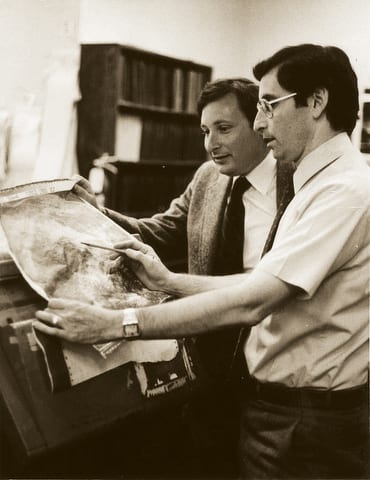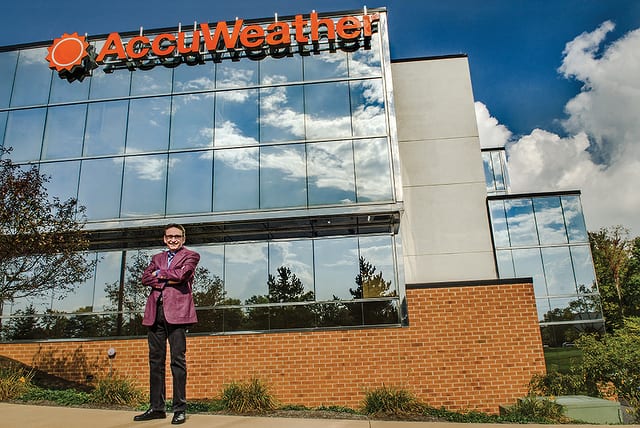This article appeared in the October issue of Town & Gown Magazine
Joel N. Myers recalls having a “burning desire” to be a weather forecaster from the time he was 7, fascinated by a snowstorm that tied up his home city of Philadelphia.
His entrepreneurial spirit was taking root around the same time.
Myers made potholders on a loom and sold them to family. He’d buy a pack of 24 greeting cards for a dollar and sell the cards for 10 cents each. He’d go door-to-door in his neighborhood, offering to sweep pavement for a dime.
The idea for what would become his own global company sprang from an article Myers’ father showed him when he was 11: a meteorologist in Boston was selling forecasts to fuel oil dealers.
Roughly a decade later, in 1962 when Myers was a grad student at Penn State, he started AccuWeather with a single client. Getting clients to buy his forecasts wasn’t an easy sell.
“I started competing with free,” Myers says, referring to National Weather Service forecasts.
His first client, a local gas utility he found through a tip from his professor and mentor Charles Hosler, paid $50 a month. Myers recalls “calling 25,000 prospects before I had 100 paying customers, and being rejected 24,900 times.”
But he persevered.
“Just keeping at it,” he says.
Persistence paid off in a big way.
Myers is founder, president, and chairman of AccuWeather, which now reaches more than 1.5 billion people through smart phones, tablets, wired and mobile internet sites, radio, television, newspapers, and the AccuWeather Network cable channel. AccuWeather serves 245 of the Fortune 500 companies, and thousands of other businesses worldwide.
And 55 years after its founding, AccuWeather’s world headquarters is still in State College, since 1998 in a gleaming glass building on a 6.5-acre campus off Science Park Road.
For his contributions to the region’s economy, to Penn State — where he taught for two decades and later served on the Board of Trustees for 33 years — and for his generosity in the community, Myers is the 2017 Renaissance Fund honoree.
“The award is designed for special people in different ways in terms of impact on the community and the campus,” says Mimi Barash Coppersmith, chairwoman of the Renaissance Fund selection committee. “It’s kind of a town and gown event supported generously by people on both sides of College Avenue. It’s truly an honor because it’s saying to the recipient, ‘we’re grateful for all you’ve done for the community and all its pieces.’”
Myers will be honored at a dinner on Nov. 29 surrounded by his seven children; his brothers, Barry and Evan, who are executives at AccuWeather; and his fiancée, Maria Mastrodicasa.
Myers earned his bachelor’s, master’s, and doctoral degrees in meteorology from Penn State in 1961, 1963, and 1971, respectively.
“Joel Myers’ success and reputation as a globally renowned business leader, and his willingness to share the fruits of his labor with his alma mater and community, represent the very best of what it means to be a Penn Stater,” Penn State President Eric J. Barron said as the university announced the honor. “The university is proud to count Joel Myers among our alumni, and we can choose no better way to celebrate our honoree than to support the scholarship that has been created in his name.”
Myers’ philanthropic contributions to the university have included a multimillion-dollar gift to the College of Earth and Mineral Sciences for The Joel N. Myers Weather Center; gifts for scholarships in meteorology and in information sciences and technology; and weather-themed sculptures, such as the sundials at the Nittany Lion Inn and The Arboretum at Penn State, and the Nittany Lion weather vane atop Beaver Stadium. Myers recently founded the Dads’ Resource Center, which helps support single fathers regarding the importance of playing an active role in the lives of their children.
“Children who have both parents involved in their life and development are going to be better developed kids than if they’re alienated from one of the parents,” he says.
He also supports the Team Pennsylvania Foundation, YMCA, Jewish Community Center, Make-A-Wish Foundation, and the American Cancer Society.

Joel Myers with his brother Barry in the early years of AccuWeather.
Coppersmith, Town&Gown’s founder who for years served on the Board of Trustees with Myers and is a past Renaissance Fund honoree, calls him “brilliant.”
“Wherever he stops, he leaves footprints because he studies, he thinks, and he delivers. He’s tough — maybe a little too tough sometimes. I can recognize it because I are one,” she says with a smile. “But he’s made a measurable difference on and off campus.”
Myers says he is grateful for the Renaissance Fund recognition, particularly since it helps disadvantaged students who are bright and work hard. That hits home for Myers.
He was the first in his family to attend college. As a state university, Penn State was “the only place I could afford to attend. I was extremely fortunate and very grateful because it had the best meteorology program in the world.”
Myers refers to “the magic of Penn State — it’s more than just a world-class education — it’s all the activities, clubs, sporting events. It’s somewhat isolated, which is a good thing because at a city university there are so many distractions. Being here and isolated, people turn inward. There is an esprit de corps, a dedication, and giving back.”
He cites THON, which has raised millions to fight childhood cancer, as “just one measure of the unique Penn State spirit.”
That loyalty to Penn State and his deep roots in the community helped keep AccuWeather in town when there were opportunities to move elsewhere.
“There are things we struggle with — transportation, sometimes getting top executives to move from the big cities, but there are a lot of advantages,” Myers says. “It’s a great community, safe relatively, a great school system, a great place to raise a family. The business has grown up here, and a lot of people have roots here.
“We have been wooed. When we were thinking of building this building, some other states offered tax incentives to move. We never got any tax incentives locally; sometimes we have to deal with the local ordinances, but there are challenges in every community.”
Beyond its Happy Valley headquarters, AccuWeather has a severe weather center in Wichita, Kansas; a sales and marketing headquarters in Manhattan’s Rockefeller Center; research and development centers in Montreal and at the University of Oklahoma, and offices in Beijing, Mumbai, Tokyo, Seoul, and Ireland.
“I’ve been blessed that the dream I had turned into a business and then a world-class business,” Myers says. “I’ve been lucky that so many people followed my dream, worked so hard, from my brothers” to long-time employees.
His first full-time employee was Elliot Abrams, who he hired part-time in 1967 when Abrams was a Penn State undergrad. Fifty years later, Abrams is AccuWeather’s senior vice president and chief forecaster.
It’s been a long road in which Myers has seized opportunities, and overcome obstacles.
As a student Myers sought to have his weather forecasts published in the Daily Collegian. He was told they would be published if he agreed to cover the police beat. The paper, he was told, did not have enough male reporters and women were not allowed off campus after 8:30 at night (“that was the Victorian age,” he says). Though not a journalism student, he says he got great experience at the Collegian and served for two years as its editorials editor.
When he sought to sell his forecasts to companies, there were more obstacles to overcome.
“The National Weather Service gives away forecasts,” he says. “I come along and say, ‘Pay me for weather forecasts. Why? Because I’m more accurate.’
“A lot of battles had to be fought, a lot of new ground had to be plowed.”
In time, Myers won clients “one by one,” through “accuracy, the intensity of our effort, understanding their business, and trying to be more valuable, helping people make better decisions.”
Those efforts included more detail, and “using the King’s English to articulate the forecast.”
Myers calls AccuWeather the first “big data company. People talk about big data and analytics today, but we’ve been doing that since the ’70s.”
Data analytics helped AccuWeather make headlines in late August. In the days after Hurricane Harvey flooded the Houston area with enormous amounts of rain, AccuWeather estimated the economic cost at $160 billion (quickly revising that to $190 billion), even as others were putting the estimate at $6 billion to $8 billion, Myers says.
“Other people said we were crazy, but everyone has now adopted the $190 billion” number, he says. Most significantly, Myers says, the estimate made a difference.
“People weren’t recognizing the magnitude of the storm. It was important to save lives and cause resources to be marshaled to get to Texas and help.”
AccuWeather clients included railroads, which were able to get their cars out of harm’s way, he says.
“Unfortunately, the mayor of Houston was not our client, and he didn’t evacuate, and he should have,” Myers says.
Myers frequently cites the loyalty and skill of AccuWeather employees, pointing to back-to-back Hurricanes Harvey and Irma as an example.
“People have worked tirelessly, amazingly,” he says. “Some worked 20 hours straight. It was a Herculean effort.”
To remain competitive, companies must continue to change, Myers says. Even beyond the weather, he’s fascinated with prediction, “trying to see over the horizon.”
Companies that don’t transform with the times “will die because the change is faster and faster and faster,” he says. “Today you will experience the slowest change that you will of any day the rest of your life. The world is accelerating on all scales. Most people can’t deal with change, and that’s a real problem because a lot of the jobs that exist today will be gone.”
Rhonda Seaton, director of marketing communications, joined AccuWeather in March.
“One of the amazing things I’ve seen since I walked in the door is how this company is continually innovating,” she says. “Somebody who’s been here as long as Joel – he was a visionary at the beginning and he’s a visionary now. A lot of the innovation is driven directly from the top. He’s always on top of what’s next, always looking for what’s next.”
What’s next for AccuWeather includes continuing to innovate with smart homes and smart cars technology, as well as a focus on how weather impacts health, Myers says.
And Myers plans to be there, leading the way. When asked, he says retirement is not in his vocabulary.
“Are people really supposed to retire? I don’t know,” he says. “Who decided that people are supposed to retire? … I think a lot of people retire because they think they’re supposed to.”
Myers says he is in good health, works out, and feels great.
“I enjoy coming to work every day. I have a lot of fun,” he says. “There are a lot of great people here — they’re very stimulating.”
In his office, Myers has a memento that sums up his keys to success: “Know your business. Focus, focus, focus. Don’t quit, don’t quit, don’t quit.”
Mark Brackenbury is editorial director of Town&Gown.
Contributing to the Renaissance Fund
The Renaissance Fund is accepting contributions to the Dr. Joel N. Myers Renaissance Scholarship. Renaissance scholarships are directed to high-achieving Penn State students with great financial need. During the 2016-17 academic year, more than 540 undergraduates received more than $816,000 in support from the Renaissance Fund scholarships created since the program began in 1969, according to the university. To learn more about making a gift to the scholarship, visit: GiveTo.psu.edu/JoelMyersRenaissanceFund



